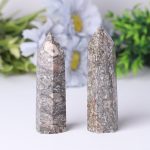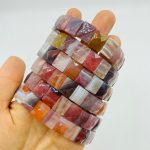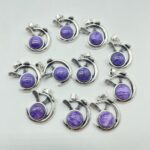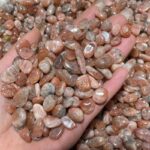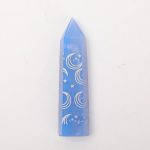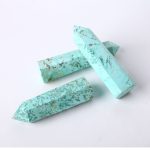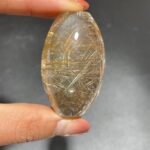Introduction
Pyrite, often hailed as “Fool’s Gold,” is a captivating and versatile mineral that has garnered attention throughout history for its distinctive metallic luster and intriguing properties. While commonly known for its golden hue, pyrite can also exhibit a mesmerizing rainbow of iridescent colors, offering a kaleidoscope of beauty beyond its traditional perception.

Scientific Properties and Composition
Pyrite, a sulfide mineral, is composed of iron and sulfur atoms arranged in a crystal structure known as isometric. Its chemical formula is FeS2, indicating one iron atom for every two sulfur atoms. Pyrite is a relatively hard mineral, ranking 6 to 6.5 on the Mohs scale of mineral hardness, making it comparable to steel. Its characteristic brassy yellow color and metallic luster stem from its high refractive index and opacity.
Formation and Occurrence
Pyrite forms through various geological processes, primarily in hydrothermal veins and sedimentary environments. It is often associated with gold, copper, lead, and zinc deposits. The presence of pyrite in geological formations can serve as an indicator of potential mineral wealth. Pyrite is found in abundance worldwide, with significant deposits in countries such as Spain, Peru, China, and the United States.
The Pyrite Rainbow
The pyrite rainbow refers to the interplay of light with the crystal structure of pyrite, resulting in a mesmerizing display of iridescent colors. This phenomenon occurs when sunlight or artificial light strikes the surface of pyrite and interacts with the mineral’s internal crystal lattice, causing light waves to interfere and produce a range of colors. The specific colors observed in the pyrite rainbow depend on the orientation of the crystal and the wavelength of the incident light.
Applications of Pyrite Rainbow
The pyrite rainbow has captured the imagination of artists, designers, and scientists, leading to its incorporation in various applications:
- Jewelry: The iridescent beauty of pyrite rainbow has made it a popular choice for jewelry designers. Pyrite gemstones are often cut and polished to enhance their color and brilliance, creating stunning pendants, earrings, and bracelets.
- Art and Decor: Pyrite rainbow has inspired artists to create captivating sculptures, mosaics, and other decorative pieces. The mineral’s vibrant colors add a touch of glamour and intrigue to interior spaces.
- Geoscience: Scientists utilize pyrite rainbow as a diagnostic tool for identifying and characterizing geological formations. The colors exhibited by pyrite can provide valuable insights into the mineral’s composition and the geological processes that formed it.
Benefits of Pyrite Rainbow
Beyond its aesthetic appeal and scientific value, pyrite rainbow offers potential therapeutic benefits:
- Energy Healing: Some practitioners of alternative medicine believe that pyrite rainbow can enhance vitality and promote physical and emotional well-being. Its iridescent colors are thought to balance the body’s energy centers or chakras.
- Protection: Pyrite has been traditionally associated with grounding and protection. Some people carry pyrite rainbow crystals or wear them as jewelry to shield against negative energies or harmful influences.
- Manifestation: The vibrant colors of pyrite rainbow are believed to inspire creativity and manifestation. Some individuals use pyrite to enhance their focus, clarity, and ability to manifest their desires.
Table 1: Physical and Chemical Properties of Pyrite
| Property | Value |
|---|---|
| Chemical Formula | FeS2 |
| Crystal Structure | Isometric |
| Color | Brassy yellow |
| Luster | Metallic |
| Hardness (Mohs Scale) | 6 to 6.5 |
| Specific Gravity | 5.02 |
| Cleavage | Poor |
| Fracture | Irregular to conchoidal |
Table 2: Formation and Occurrence of Pyrite
| Occurrence | Environment | Associated Minerals |
|---|---|---|
| Hydrothermal Veins | High-temperature fluid flow | Gold, copper, lead, zinc |
| Sedimentary Environments | Marine or lacustrine deposits | Fossils, coal, organic matter |
| Metamorphic Rocks | High pressure and temperature | Pyrite crystals, magnetite, quartz |
Table 3: Applications of Pyrite Rainbow
| Application | Uses |
|---|---|
| Jewelry | Pendants, earrings, bracelets |
| Art and Decor | Sculptures, mosaics, decorative pieces |
| Geoscience | Identification and characterization of geological formations |
Table 4: Benefits of Pyrite Rainbow
| Benefit | Description |
|---|---|
| Energy Healing | Enhances vitality, promotes physical and emotional well-being |
| Protection | Shielding against negative energies or harmful influences |
| Manifestation | Inspires creativity and the ability to manifest desires |
Conclusion
The pyrite rainbow is a captivating and versatile phenomenon that showcases the beauty and versatility of pyrite. From its geological origins to its applications in art, decoration, and potential therapeutic benefits, pyrite rainbow continues to fascinate and inspire. As scientists and artists delve deeper into the properties of pyrite, we can expect to uncover even more exciting and innovative uses for this enigmatic mineral.











